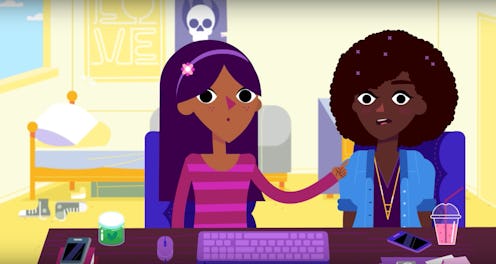More and more colleges are teaching their students about sexual consent in order to fight the campus assault epidemic. But the fact of the matter is, consent is about more than sex, and teaching people about it should start even younger. Thankfully, AMAZE's "Consent" video provides a fun, accessible way to teach kids ages 10-14 about consent of all varieties so that they not only get a head start on learning about sexual consent but also understand how to apply these principles to every interaction.
Like many tools for teaching about consent, this one presents an analogy. It starts with a girl calling out to her friend in the next room and asking if she'd like to see a horror film. She doesn't hear anything, so she concludes, "OK, well, she didn't say 'no,' so count us in."
Then, a voiceover says, "sexual consent means that both people are actively willing to engage in a sexual behavior and express their consent by saying 'yes, that's OK with me.' But just because someone consents to engage in one kind of behavior does not mean they've agreed to engage in another." It then goes through all the basic principles of consent: Someone can always change their mind, a lack of "no" doesn't mean "yes," and you can't give consent under the influence of alcohol or drugs.
In the final scene, the protagonist is again asking her friend a question, and she still doesn't respond — so she just decides on another movie she already knows she likes.
As this video shows, analogies can be very useful for talking about consent, since we have this same principle in other areas of life outside sex. One viral video a while back explained how sex is like tea: You wouldn't serve someone tea unless they clearly, in a sound state of mind, wanted it, and you wouldn't take someone's desire for tea at one point as an indication that they wanted it at another point. A more recent video explains how sex is like masturbation: The same way you wouldn't have sex with yourself if you weren't totally willing to do so, it wouldn't make sense to have sex with someone else under these circumstances.
In addition, a set of comics by Everyday Feminism's Alli Kirkham shows what life would look like if we treated other forms of consent the way we treat sexual consent. We'd steal items from people because they once let us borrow them, start sports games with people just because they were dressed in uniforms, and give people tattoos they want while they're unconscious. These scenarios seem ridiculous when we apply them outside sex, and they should seem ridiculous in sexual scenarios as well.
As AMAZE's video shows, we should have the same respect for someone's sexual boundaries as we would their desire to see or not see a movie, and we shouldn't take anything other than a "yes" in either scenario to mean "yes."
"We took consent out of a sexual context so it would be easy to see that we — young people and adults — are constantly consenting to certain behaviors and setting boundaries with other people," Lucinda Holt of Answer, sexual health expert and content manager for AMAZE.org, tells Bustle over email. "We're always determining what we do or do not want to do with another person, whether that's playing ping pong or deciding if we want another person to hug us."
AMAZE decided to use the scenario of deciding what movie to see because young teens and pre-teens could relate to it. "When we talk about consent, it gets limited to sexual consent, but it's a much broader topic that is important and relevant for younger children who are learning to set and respect each other's boundaries," said Holt. "As they get older and learn more about sexual consent, it's not then a mysterious concept, but very much like the many other decisions they make about what they want to do and how to respect each others' boundaries."
You can watch the full video above and head over to AMAZE's Youtube channel for lots of fun sex ed videos geared toward kids.
